英语必修一第四单元测试及答案
人教版高中英语必修第一册:Unit4Naturaldisasters单元测试(含答案与解析)

Unit 4 Natural Disasters 单元测试选择题部分第一部分听力(共两节,满分30分)第一节(共5小题;每小题1.5分,满分7.5分)听下面5段对话。
每段对话后有一个小题,从题中所给的A、B、C三个选项中选出最佳选项。
听完每段对话后,你都有10秒钟的时间来回答有关小题和阅读下一小题。
每段对话仅读一遍。
1. What does Mr Brown most probably do at the school?A. He teaches art.B. He learns painting.C. He repairs equipment.2. Why did the man get a ticket?A. He drove fast.B. He ran a red light.C. He parked at the wrong place.3. Who spoke to Robert?A. His teacher.B. His boss.C. His partner.4. Where is the man in the dialogue?A. In a hotel.B. At home.C. In a hospital.5. What do we know about the chair?A. It is damaged.B. It is blue and yellow.C. The salesman is charging $ 159 for it.第二节(共15小题;每小题1.5分,满分22.5分)听下面5段对话或独白。
每段对话或独白后有几个小题,从题中所给的A、B、C三个选项中选出最佳选项。
听每段对话或独白前,你将有时间阅读各个小题,每小题5秒钟;听完后,各小题将给出5秒钟的作答时间。
每段对话或独白读两遍。
听第6段材料,回答第6、7题。
6. Where is the Chinese restaurant?A. On King Street.B. On Queen Street.C. On Green Street.7. What time will they have dinner?A. At 6 p. m.B. At 7 p. m.C. At 8 p. m.听第7段材料,回答第8、9题。
高中英语(新人教版)选择性必修一课后习题:第四单元测评(课后习题)【含答案及解析】
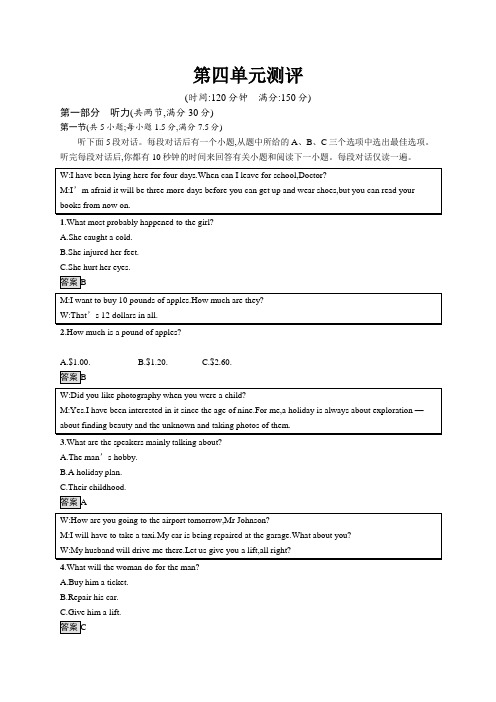
第四单元测评(时间:120分钟满分:150分)第一部分听力(共两节,满分30分)第一节(共5小题;每小题1.5分,满分7.5分)听下面5段对话。
每段对话后有一个小题,从题中所给的A、B、C三个选项中选出最佳选项。
听完每段对话后,你都有10秒钟的时间来回答有关小题和阅读下一小题。
每段对话仅读一遍。
1.What most probably happened to the girl?A.She caught a cold.B.She injured her feet.C.She hurt her eyes.2.How much is a pound of apples?A.$1.00.B.$1.20.C.$2.60.3.What are the speakers mainly talking about?A.The man’s hobby.B.A holiday plan.C.Their childhood.4.What will the woman do for the man?A.Buy him a ticket.B.Repair his car.C.Give him a lift..What interests the man better?A.Writing novels.B.Reading poems.C.Surfing the Internet.第二节(共15 小题;每小题1.5分,满分22.5分)听下面5段对话或独白。
每段对话或独白后有几个小题,从题中所给的A、B、C三个选项中选出最佳选项。
听每段对话或独白前,你将有时间阅读各个小题,每小题5秒钟;听完后,各小题将给出5秒钟的作答时间。
每段对话或独白读两遍。
听第6段材料,回答第6、7题。
6.When does the conversation probably take place?A.In the morning.B.In the afternoon.C.In the evening.7.Who will pay the bill?A.The woman.B.The man.C.Both of them.听第7段材料,回答第8至10题。
高中英语必修一第四单元测试题(附答案)

第四单元测试(时间:120分钟总分:150分)第Ⅰ卷第一部分:听力(共两节,满分30分)第一节(共5小题;每小题1.5分,满分7.5分)听下面5段对话。
每段对话后有一个小题,从题中所给的A、B、C三个选项中选出最佳选项。
听完每段对话后,你都有10秒钟的时间来回答有关小题和阅读下一小题。
每段对话仅读一遍。
M:Look at those beautiful birds over there.I think you can teach them to talk.W:But look at the price! I'd rather have a cat.1.Where does the conversation most probably take place?A.In a park. B.In a zoo.C.In a pet store.M:I suppose the reason why so many tourists come here is that everything is so cheap.W:Cheap?Nothing is really cheap here.2.What does the woman mean?A.Things here are very cheap.B.Things here are not cheap.C.She doesn't know whether things here are cheap or not.W:Where are you going to plant the tree?By the front door?M:No,that would be silly.It'll grow too big.I'm going to put it at the back of the garage.W:I thought it would be better at the end of the garden.M:OK.3.Where are the two speakers going to plant the tree?A.By the front door.B.At the back of the garage.C.At the end of the garden.M:Can I take your coat,Madam?W:Thank you.M:And would you like something to drink before you order your meal?4.Where does the conversation take place?A.In a shop. B.In a hotel. C.In a restaurant.W:Where were you on Christmas,David?I called you several times and nobody was home.M:My parents and I travelled to New Zealand to visit my uncle.It was quite an experience to spend Christmas in summer.5.What do we learn from the conversation?A.The man went to New Zealand during Christmas.B.The man stayed at home during the holiday.C.The man's parents live in New Zealand.第二节(共15小题;每小题1.5分,满分22.5分)听下面5段对话或独白。
高中英语必修 第一册-新人教 必修一 Unit 4 单元检测卷(含答案)
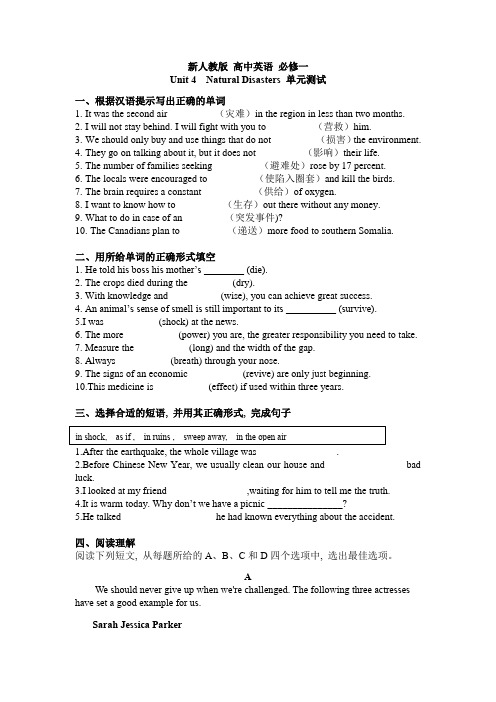
新人教版高中英语必修一Unit 4 Natural Disasters 单元测试一、根据汉语提示写出正确的单词1.It was the second air ________ (灾难)in the region in less than two months.2.I will not stay behind. I will fight with you to ________ (营救)him.3.We should only buy and use things that do not ________ (损害)the environment.4.They go on talking about it, but it does not ________ (影响)their life.5.The number of families seeking ________ (避难处)rose by 17 percent.6.The locals were encouraged to ________ (使陷入圈套)and kill the birds.7.The brain requires a constant ________ (供给)of oxygen.8.I want to know how to ________ (生存)out there without any money.9.What to do in case of an ________(突发事件)?10.The Canadians plan to ________ (递送)more food to southern Somalia.二、用所给单词的正确形式填空1.He told his boss his mother’s ________ (die).2. The crops died during the ________ (dry).3. With knowledge and __________(wise), you can achieve great success.4. An animal’s sense of smell is still important to its __________ (survive).5.I was __________ (shock) at the news.6. The more __________ (power) you are, the greater responsibility you need to take.7. Measure the __________ (long) and the width of the gap.8. Always __________ (breath) through your nose.9. The signs of an economic __________ (revive) are only just beginning.10.This medicine is __________ (effect) if used within three years.三、选择合适的短语, 并用其正确形式, 完成句子in shock, as if , in ruins , sweep away, in the open air1.After the earthquake, the whole village was _______________ .2.Before Chinese New Year, we usually clean our house and _______________ bad luck.3.I looked at my friend _______________ ,waiting for him to tell me the truth.4.It is warm today. W hy don’t we have a picnic _______________?5.He talked _________________he had known everything about the accident.四、阅读理解阅读下列短文, 从每题所给的A、B、C和D四个选项中, 选出最佳选项。
人教版高中英语必修第一册第四单元过关检测(B卷)含答案

第四单元过关检测(B卷)(时间:120分钟满分:150分)第一部分听力(共两节,满分30分)第一节(共5小题;每小题1.5分,满分7.5分)听下面5段对话。
每段对话后有一个小题,从题中所给的A、B、C三个选项中选出最佳选项。
听完每段对话后,你都有10秒钟的时间来回答有关小题和阅读下一小题。
每段对话仅读一遍。
A.Send an email.B.Call back later.C.Leave a message.答案:BA.In the winter.B.In the spring.C.In the summer.答案:AA.Doing back movements.B.Doing exercises for his stomach.C.Watching the new exercise programme.答案:BA.By email.B.By letter.C.By telephone.答案:AA.Study hard.B.See a doctor.C.Find a part-time job.答案:A第二节(共15小题;每小题1.5分,满分22.5分)听下面5段对话或独白。
每段对话或独白后有几个小题,从题中所给的A、B、C 三个选项中选出最佳选项。
听每段对话或独白前,你将有时间阅读各个小题,每小题5秒钟;听完后,各小题将给出5秒钟的作答时间。
每段对话或独白读两遍。
听第6段材料,回答第6、7题。
A.A writer.B.A singer.C.A teacher.答案:B7.What happened during the concert?A.The audience shouted loudly.B.The performance was stopped.C.All the lights went out suddenly.答案:C听第7段材料,回答第8、9题。
A.It runs too slow.B.It has a broken screen.C.It can’t be used to type at all.答案:A9.What will the man do tomorrow morning?A.Have a meeting.B.Fix the computer.C.Buy a ring for the woman.答案:A听第8段材料,回答第10至12题。
人教版高一英语必修1Unit4练习试题及答案
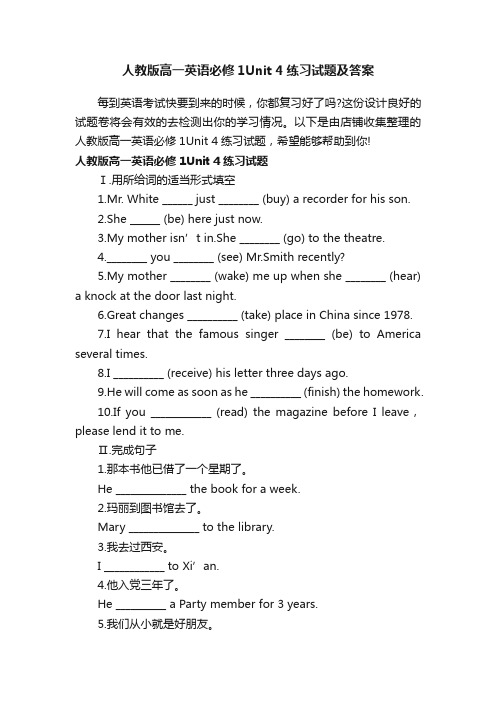
人教版高一英语必修1Unit 4练习试题及答案每到英语考试快要到来的时候,你都复习好了吗?这份设计良好的试题卷将会有效的去检测出你的学习情况。
以下是由店铺收集整理的人教版高一英语必修1Unit 4练习试题,希望能够帮助到你!人教版高一英语必修1Unit 4练习试题Ⅰ.用所给词的适当形式填空1.Mr. White ______ just ________ (buy) a recorder for his son.2.She ______ (be) here just now.3.My mother isn’t in.She ________ (go) to the theatre.4.________ you ________ (see) Mr.Smith recently?5.My mother ________ (wake) me up when she ________ (hear)a knock at the door last night.6.Great changes __________ (take) place in China since 1978.7.I hear that the famous singer ________ (be) to America several times.8.I __________ (receive) his letter three days ago.9.He will come as soon as he __________ (finish) the homework.10.If you ____________ (read) the magazine before I leave,please lend it to me.Ⅱ.完成句子1.那本书他已借了一个星期了。
He ______________ the book for a week.2.玛丽到图书馆去了。
人教版高中英语必修一第四单元检测题及答案解析
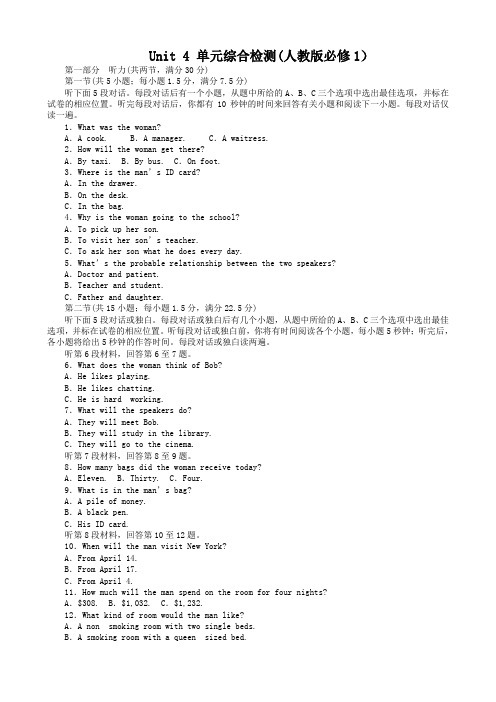
Unit 4 单元综合检测(人教版必修1)第一部分听力(共两节,满分30分)第一节(共5小题;每小题1.5分,满分7.5分)听下面5段对话。
每段对话后有一个小题,从题中所给的A、B、C三个选项中选出最佳选项,并标在试卷的相应位置。
听完每段对话后,你都有10秒钟的时间来回答有关小题和阅读下一小题。
每段对话仅读一遍。
1.What was the woman?A.A cook. B.A manager. C.A waitress.2.How will the woman get there?A.By taxi. B.By bus. C.On foot.3.Where is the man’s ID card?A.In the drawer.B.On the desk.C.In the bag.4.Why is the woman going to the school?A.To pick up her son.B.To visit her son’s teacher.C.To ask her son what he does every day.5.What’s the probable relationship between the two speakers?A.Doctor and patient.B.Teacher and student.C.Father and daughter.第二节(共15小题;每小题1.5分,满分22.5分)听下面5段对话或独白。
每段对话或独白后有几个小题,从题中所给的A、B、C三个选项中选出最佳选项,并标在试卷的相应位置。
听每段对话或独白前,你将有时间阅读各个小题,每小题5秒钟;听完后,各小题将给出5秒钟的作答时间。
每段对话或独白读两遍。
听第6段材料,回答第6至7题。
6.What does the woman think of Bob?A.He likes playing.B.He likes chatting.C.7.What will the speakers do?A.They will meet Bob.B.They will study in the library.C.They will go to the cinema.听第7段材料,回答第8至9题。
Unit4 单元综合测评 附答案 人教版高中英语必修第一册
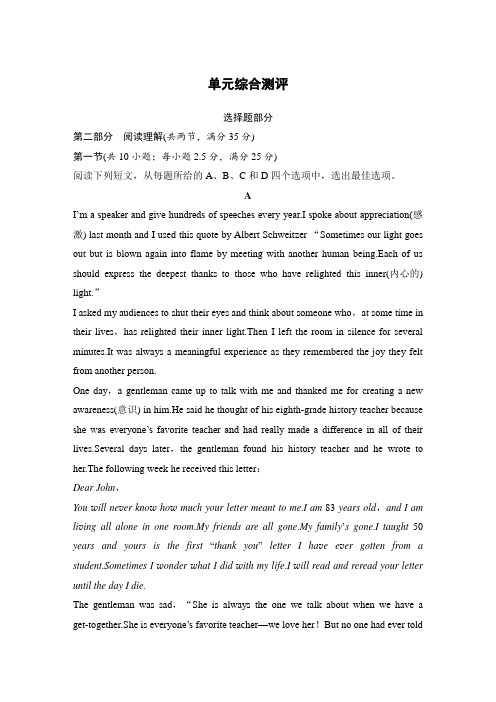
单元综合测评选择题部分第二部分阅读理解(共两节,满分35分)第一节(共10小题;每小题2.5分,满分25分)阅读下列短文,从每题所给的A、B、C和D四个选项中,选出最佳选项。
AI’m a speaker and give hundreds of speeches every year.I spoke about appreciation(感激) last month and I used this quote by Albert Schweitzer “Sometimes our light goes out but is blown again into flame by meeting with another human being.Each of us should express the deepest thanks to those who have relighted this inner(内心的) light.”I asked my audiences to shut their eyes and think about someone who,at some time in their lives,has relighted their inner light.Then I left the room in silence for several minutes.It was always a meaningful experience as they remembered the joy they felt from another person.One day,a gentleman came up to talk with me and thanked me for creating a new awareness(意识) in him.He said he thought of his eighth-grade history teacher because she was everyone’s favorite teacher and had really made a difference in all of their lives.Several days later,the gentleman found his history teacher and he wrote to her.The following week he received this letter:Dear John,You w ill ne v er kno w ho w much your letter meant to me.I am 83 years old,and I am li v ing all alone in one room.My friends are all gone.My family’s gone.I taught50 years and yours is the first“thank you” letter I ha v e e v er gotten from a student.Sometimes I w onder w hat I did w ith my life.I w ill read and reread your letter until the day I die.The gentleman was sad,“She is always the one we talk about when we have a get-together.She is everyon e’s favorite teacher—we love her!But no one had ever toldher until she received my letter...”【语篇解读】本文是记叙文。
高一英语必修一Unit4单元测试题及答案
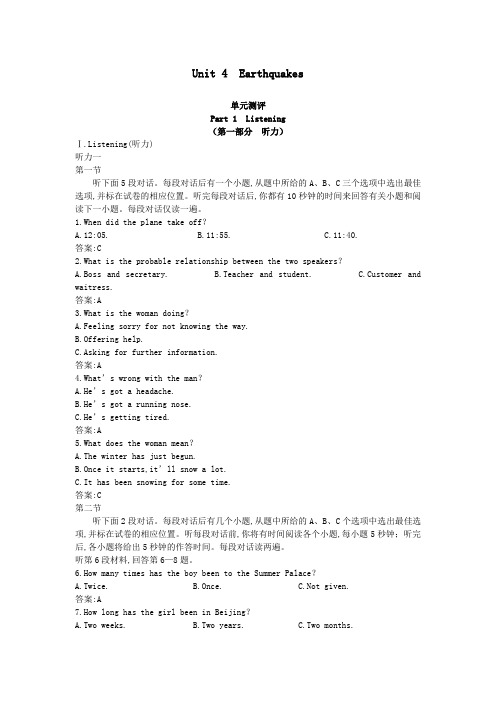
Unit 4 Earthquakes单元测评Part 1 Listening(第一部分听力)Ⅰ.Listening(听力)听力一第一节听下面5段对话。
每段对话后有一个小题,从题中所给的A、B、C三个选项中选出最佳选项,并标在试卷的相应位置。
听完每段对话后,你都有10秒钟的时间来回答有关小题和阅读下一小题。
每段对话仅读一遍。
1.When did the plane take off?A.12:05.B.11:55.C.11:40.答案:C2.What is the probable relationship between the two speakers?A.Boss and secretary.B.Teacher and student.C.Customer and waitress.答案:A3.What is the woman doing?A.Feeling sorry for not knowing the way.B.Offering help.C.Asking for further information.答案:A4.What’s wrong with the man?A.He’s got a headache.B.He’s got a running nose.C.He’s getting tired.答案:A5.What does the woman mean?A.The winter has just begun.B.Once it starts,it’ll snow a lot.C.It has been snowing for some time.答案:C第二节听下面2段对话。
每段对话后有几个小题,从题中所给的A、B、C个选项中选出最佳选项,并标在试卷的相应位置。
听每段对话前,你将有时间阅读各个小题,每小题5秒钟;听完后,各小题将给出5秒钟的作答时间。
每段对话读两遍。
听第6段材料,回答第6—8题。
人教版高一英语第一册 Unit 4 单元测试题(含答案)
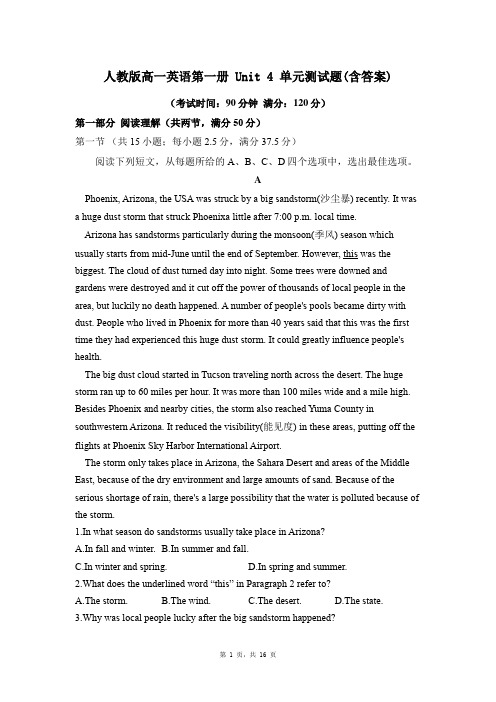
人教版高一英语第一册 Unit 4 单元测试题(含答案)(考试时间:90分钟满分:120分)第一部分阅读理解(共两节,满分50分)第一节(共15小题;每小题2.5分,满分37.5分)阅读下列短文,从每题所给的A、B、C、D四个选项中,选出最佳选项。
APhoenix, Arizona, the USA was struck by a big sandstorm(沙尘暴) recently. It was a huge dust storm that struck Phoenixa little after 7:00 p.m. local time.Arizona has sandstorms particularly during the monsoon(季风) season which usually starts from mid-June until the end of September. However, this was the biggest. The cloud of dust turned day into night. Some trees were downed and gardens were destroyed and it cut off the power of thousands of local people in the area, but luckily no death happened. A number of people's pools became dirty with dust. People who lived in Phoenix for more than 40 years said that this was the first time they had experienced this huge dust storm. It could greatly influence people's health.The big dust cloud started in Tucson traveling north across the desert. The huge storm ran up to 60 miles per hour. It was more than 100 miles wide and a mile high. Besides Phoenix and nearby cities, the storm also reached Yuma County in southwestern Arizona. It reduced the visibility(能见度) in these areas, putting off the flights at Phoenix Sky Harbor International Airport.The storm only takes place in Arizona, the Sahara Desert and areas of the Middle East, because of the dry environment and large amounts of sand. Because of the serious shortage of rain, there's a large possibility that the water is polluted because of the storm.1.In what season do sandstorms usually take place in Arizona?A.In fall and winter.B.In summer and fall.C.In winter and spring.D.In spring and summer.2.What does the underlined word “this” in Paragraph 2 refer to?A.The storm.B.The wind.C.The desert.D.The state.3.Why was local people lucky after the big sandstorm happened?A.People's health was not influenced.B.It didn't do harm to people's gardens.C.All the local people in the area survived.D.The electricity was not affected at all.4.What can probably be the title of the passage?A.Phoenix, Arizona has more sandstormsB.Sandstorms do a great deal of harm to peopleC.We must do something to prevent sandstormsD.Phoenix, Arizona experienced a huge sandstormBA 9.0-magnitude earthquake off the Indonesian coast sent a wall of water racing toward Thailand, Malaysia and Sri Lanka. Lang was on the island of Phi Phi Don, just south of Phuket, Thailand, shopping on Main Street with her friend Rubina Wong, when suddenly everything changed. "People started running inland. From where we were, we could not see the beach so we had no idea what was going on," she said.Lang and Rubina started running inland in the same direction as everyone else, when she noticed water flooding into the island, but it was so strong and fast that she could no longer lift her feet to run. Rubina had gone down a side street. Lang never saw her alive again.Lang was stuck underwater between pieces of debris(碎片) with the surface just above her face. "The more I struggled(挣扎), the tighter I was stuck. I could not reach the surface. I thought I came here on my vacation to die, and then I got really annoyed," she said. "I must have blacked out because the next thing I remember is waking up underwater."The water was still and black. Lang looked up and could see that at the top, there was a small circle of light. She started swimming through the water and made it to the surface of the water. She pulled herself onto a floating door and could see that the whole island was flooded and a lot of buildings were gone. She could see a house not far away and a man on its roof. She encouraged herself to climb over the floating objects to the balcony(阳台) of the house. From there she saw the water start to slowly go back to the ocean.5.What was Lang doing when the tsunami happened?A.She was running in a race.B.She was playing on the beach.C.She was shopping in the street.D.She was looking for her friend.6.Why was Lang unable to run?A.There was a wall in the way.B.She feared she would get lost.C.She had to wait for her friend.D.The racing water was too powerful.7.What can we learn about Lang from Paragraph 3?A.She didn't want to struggle.B.She was trapped underwater.C.She didn't regret going on vacation.D.She kept awake all the time in the water.8.How did Lang manage to save herself?A.By calling for help.B.By hiding in a house.C.By climbing up a tall tree.D.By making use of floating objects.CWhat do you think of when you hear the word “drought”? Do you think of “dry” “hot” “dusty” “cracked(开裂的)earth” or even “no water”? If so, you’re on the right track!When some places are in drought, they may be dry, hot and dusty. Cracks may appear in the soil, and rivers, lakes, streams, and other sources of water may go dry. Other places in drought get some rain, but not as much as they usually receive during that season. Drought means that a place has less rain or snow than normal over a few months or even longer.Drought has many causes. It can be caused by not receiving rain or snow over a period of time. We learned in the discussions above about the water cycle and weather. The changes in the wind patterns that move clouds and moisture through the atmosphere can cause a place not to receive its normal amount of rain or snow over a long period of time.If you live in a place where most of the water you use comes from a river, a drought in your area can be caused by places upstream from you not receiving enough moisture. There would be less water in the river for you and other people who live along the river to use.People can also play a big role in a drought. If we use too much water during times of normal rainfall, we might not have enough water when a drought happens.9.What’s the purpose of Paragraph 1?A. To introduce the topic.B. To analyze the problem.C. To conclude the article.D. To put forward an argument.10.What will happen if a place is in drought?A. The weather will be dry, hot and windy.B. There won’t be any water left in rivers or lakes.C. There will be less rain or snow for quite a long time.D. The rainy season will be replaced by the snowy season.11.What’s the meaning of the underlined word “moisture” in Paragraph 3?A. Dust in the wind.B. Rain in the soil.C. Snow on the ground.D. Water in the air.12.What topics are discussed before the passage?A. The definition(定义) of drought.B. The water cycle and weather.C. The causes of drought.D. The influence of drought.DThe Horn of Africa was struck by billions of locusts(蝗虫). They flew through fields of crops at an amazing speed, killing crops in the process. The locusts crossed the Gulf of Aden and arrived in Somalia and Ethiopia. They were then found in Kenya and had become the worst disaster there in 70 years.The U.N. says the area is affected by lack of food, and it warns that the international community only has a small window of opportunity to prevent future disaster". "These things are always voracious," says Keith Cressman. A swarm(一大群) the size of Manhattan can, in a single day, eat the same amount of food as everyone in both New York and California, he says. Swarms of desert locusts more than three times the size of New York City have been seen in northeast Kenya.Experts know how to stop the locusts' spread, but say efforts have been prevented by a lack of resources because it's difficult to spray pesticide(喷洒农药) in conflict-racked(冲突肆虐的) places such as Somalia and Yemen. "We do have a chance to solve this problem in the bud, but that's not what we're doing at the moment," Mark Lowcock said. "We're running out of time."Desert locusts are known for their rapid reproduction and ability to move long distances with the wind. "This kind of insect has been around for a long time," Mark Lowcock said. "It has so many different survival ways...to just survive in some of the harshest conditions and remotest parts of the planet. But it has the great ability to take advantage of good conditions." It reproduces rapidly—every three months, and in suitable conditions, the population could increase by 400 times every six months.13.Where might locusts first appear?A.In Ethiopia.B.In Somalia.C.In Kenya.D.In the Gulf of Aden.14.What does the underlined word “voracious” mean?A.Expecting to fly.B.Wanting to eat.C.Being curious.D.Being cautious.15.Which might be the cause of the locusts' spread?A.Experts' unawareness of how to prevent the locusts' spread.ck of people to deal with locusts.C.The good living environment of the desert.D.Losing the chance to solve the locust problem in the bud.16.What is Paragraph 4 mainly about?A.Desert locusts' ability to take advantage of good conditions.B.Desert locusts' long life on the earth.C.Desert locusts' ability to reproduce and survive.D.Desert locusts' different survival abilities.第二节(共5小题;每小题2.5分,满分12.5分)根据短文内容,从短文后的选项中选出能填入空白处的最佳选项。
人教版高中英语必修一Unit4单元测试后附答案

人教版高中英语必修一Unit4单元测试含答案重点单词短语考核和能力提升一、单句语法填空(本大题共3小题,共6.0分)1.The bridge has been under_________(construct) for about two years, but it is still unclearwhen it can be completed.2.He was punished for_________(打扰) other when they were working.3.We all depend on our parents for food, _________(衣物) and shelter.三、单选题(本大题共11小题,共11.0分)4.________ we looked at it, the better we liked the oil painting.A. AsB. WhileC. The momentD. The more5.To people's great surprise, in Japan Earthquake, a young man ________ the bigearthquake under the ruins where he stayed 7 days without anything to eat.A. livedB. stayedC. survivedD. remained6.—Is Mr. Wang in?—Sorry,he ________ lives here. He has moved.A. no moreB. not moreC. no longerD. not longer7.I received his mother's phone call at ten. Only then did I know that he was badly________in an accident the day before yesterday.A. hurtB. injuredC. harmedD. wounded8.I lost my key this morning,so I had no choice but________ for my husband.A. waitB. to waitC. waitingD. waited9.You will________ your chances of getting a pay rise if you don't work harder than others.A. injureB. woundC. harmD. ruin10.—Excuse me,can you spare me a few minutes?—_______?A. What's onB. What's upC. What is itD. What's more11.________ terrible weather it was when tsunami and earthquakes happened in Japan.A. HowB. How aC. WhatD. What a12.The Browns lived____ in the old society.A. miserable lifeB. miserable liveC. a miserable lifeD. miserable lives13.There was an excited expression ______ his face when he heard the good news.A. ofB. onC. atD. over14.—What a mistake!—Yes. I________ his doing it another way, but without success.A. was suggestingB. will suggestC. would suggestD. had suggested四、阅读理解(本大题共8小题,共16.0分)AOn October 12, 1989, some British scientists were working at the computers to look for the information they needed. Suddenly they saw a lot of very bright points crossing the computer screens. At the same time the computers were working much slower. To find out what was happening they stopped their work to check some parts of the computers. To their horror,they found out that most of their stored information was got rid of by computer viruses(病毒)!Clearly all these computers had been infected by computer viruses.It is said that the computer viruses were made by a group of young men fond of playing tricks. They all had excellent education. They created the viruses just to show their intelligence. These kinds of computer viruses are named Jerusalem Viruses. These viruses can stay in computers for a long time. When the time comes they will attack(袭击)the computers by lowering the functions, damaging their normal programs or even getting rid of all the information.We now come to know that Jerusalem Viruses often attack computers on Friday and that they are spreading(传播)to a lot of computers. Among the countries that were attacked by computer viruses last year are Britain, Australia, Switzerland and the U.S. But till now, how to get rid of the terrible viruses remains a problem.15.When the viruses attack the computers, the computers will work .A. normallyB. slowlyC. fasterD. well16.The group of young men created the viruses to .A. damage the computersB. test their abilityC. tell people that they were intelligentD. play a trick on users of the computers17.According to the passage, computer viruses seem to .A. have been in nature for yearsB. stay in any computersC. be difficult to get rid of at presentD. be able to be got rid of in the near future18.According to the passage, which of the following is TRUE?A. Last year six countries found their computers were infected by viruses.B. The viruses will come to a new computer after staying in the old one for some time.C. Scientists are trying to find a way to get rid of the viruses.D. The Jerusalem Viruses are dangerous to human health.BTim Richter and his wife, Linda, had taught for over 30 years near Buffalo, New York—he in computers, she in special education.“Teaching means everything to us,” Tim would say. In April 1998, he learned he would need a heart operation. It was the kind of news that leads to some serious thinking about life's purpose.Not long after the surgery, Tim saw a brochure describing Imagination Library, a program started by Dolly Parton's foundation (基金会) that mailed a book every month to children from birth to age five in the singer's home town of Sevier, Tennessee. “I thought, maybe Linda and I could do something like this when we retire,”Tim recalls. He placed the brochure on his desk,“as a reminder.”Five years later, now retired and with that brochure still on the desk, Tim clicked on imagination library .com. The program had been opened up to partners who could take advantage of book and postage discounts.The quality of the books was of great concern to the Richters. Rather than sign up online, they went to Dollywood for a look-see. “We didn't want to give the children rubbish,” says Linda. The books reviewed each year by teachers, literacy specialists and Dollywood board members included classics such as Ezra Jack Keats's The Snowy Day and newer books like Anna Dewdney's Llama Llama series.Satisfied, the couple set up the Richter Family Foundation and got to work. Since 2004, they have shipped more than 12,200 books to preschoolers in their area. Megan Williams, a mother of four, is more than appreciative: “This program introduces us to books I've never heard of .”The Richters spend about $ 400 a month sending books to 200 children. “Some people sit there and wait to die,” says Tim. “Others get as busy as they can in the time they have left.”19.What let Tim think seriously about the meaning of life?A. His health problem.B. His love for teaching.C. The influence of his wife.D. The news from the Web.20.What did Tim want to do after learning about Imagination Library?A. Give out brochures.B. Do something similar.C. Write books for children.D. Retire from being a teacher.21.According to the text,Dolly Parton is________.A. a well-known surgeonB. a mother of a four-year-oldC. a singer born in TennesseeD. a computer programmer22.Why did the Richters go to Dollywood?A. To avoid signing up online.B. To meet Dollywood board members.C. To make sure the books were the newest.D. To see if the books were of good quality.五、短文改错(本大题共1小题,共10.0分)短文改错,假定英语课上老师要求同桌之间交换修改作文,请你修改你同桌写的以下作文。
人教版高二英语必修第一册 Unit 4 单元测试题(含答案)

人教版高二英语必修第一册 Unit 4 单元测试题(含答案)(考试时间:90分钟满分:120分)第一部分阅读理解(共两节,满分50分)第一节(共15小题;每小题2.5分,满分37.5分)阅读下列短文,从每题所给的A、B、C、D四个选项中,选出最佳选项。
AMetropolis Book ClubMembership:All you need to do is fill out the order form at the bottom of the page, select your first order from our book list and then post the completed form back to us.Special offers for new members:As a special offer, you may choose any reduced-price books from our new members, book list, to the value of 100 yuan in total.Tick (打上钩) the box on your form to order a free watch.Join before the end of this month and you receive another free book carefully chosen by our staff.Order an audio book from the many on offer, at half the recommended retail price. When you've joined:As a member you get around 50% off the publisher's price of every book you buy, and what's more, they come straight to your door. Your free club magazine arrives once a month to keep you up to date with the latest best-sellers we've added to our list. On the Internet, you can find all our titles for the year on our exclusive members' website. Our website also has a book swap service where members can request or offer books for exchange.Being a member:All you have to do is order four books during your first year. After that, you can decide on the number of books you wish to take.In each of your monthly club magazines, our experienced staff choose a "Book of the Month" for you, which is offered at an extra-special price. If you do not want this book, just say so in the space provided on the form and send it back to us. We always send the book if we do not receive this form.Once we receive your order, your books are delivered within one week. And remember, you have up to a fortnight to decide if you wish to keep the books you have ordered. If they aren't what you expected just send them back!1.How can you become a member of the Metropolis Book Club?A.By ordering a watch free of charge.B.By sending the advertisement to the club.C.By choosing books with special prices.D.By returning the completed order form.2.What information does the monthly magazine give members?A.The percentage saved on each book.B.The names of all the books sold by the club.C.The list of the newest books available to buy.D.The books that can be swapped by club members.3.What can we infer from the last part of the passage?A.At least four books should be bought each year.B.Members can look at the books before they buy them.C.Members need to buy the "Book of the Month".D.The more books bought, the higher the member's grade.BMuch meaning can be conveyed, clearly, with our eyes, so it is often said that eyes can speak.Do you have such kind of experience? In a bus you may look at a stranger, but not too long. And if he is sensing that he is being stared at, he may feel uncomfortable.The same is true in daily life. If you are looked at for more than necessary, you will look at yourself up and down, to see if there is anything wrong with you. If nothing goes wrong, you will feel angry towards others, staring at you that way. Eyes do speak, right?Looking too long at someone may seem to be rude and aggressive. But things are different when it comes to staring at the opposite sex. If a man glances at a woman for more than 10 seconds and refuses to move his gaze, his intentions are obvious, that is, he wishes to attract her attention, to make her understand that he is admiring her.However, the normal eye contact for two people engaged in a conversation is that the speaker will only look at the listener from time to time, in order to make sure thatthe listener does pay attention to what the former is speaking, and to tell him that he is attentive.If a speaker looks at you continuously when speaking, as if he tries to dominate you. you will feel uncomfortable. A poor liar usually exposes himself by looking too long at the victim, since he believes in the false idea that to look straight in the eye is a sign of honest communication. Quite the contrary.In fact, continuous eye contact is confined to lovers only, who will enjoy looking at each other tenderly for a long time, to show affection that words cannot express.Evidently, eye contact should be done according to the relationship between two people and the specific situation.1.Which of the following behaviour is proper according to the passage?A.To the opposite sex, stare at him or her.B.To a stranger, avoid looking at him or her.C.In a conversation, look at the listener all the time.D.Make eye contact depending on the relationship and different situations.2.If two persons exchange eye contact gently for a long time, what is probably their relationship?A. Boss and employee.B. Lovers.C. Teacher and student.D. Strangers.3.What's the best title of the passage?A. Don't Stare at OthersB. Body language Is ImportantC. Eyes Can SpeakD. Eye Contact Benefits YouCHow many different emotions do you think you can communicate to people with your face? Do you have the same facial expressions as the people from different cultures? Read this passage to find out what scientists have just discovered about this topic.New research suggests that there are only four basic facial expressions of emotion. However, how these expressions are interpreted(解释) might depend on where you are from. Research by scientists from the Institute of Neuroscience and Psychology at the University of Glasgow has challenged the traditional view of how the face expresses emotions. It was widely believed that six basic emotions (happiness,sadness, fear, anger, surprise and disgust) were expressed and recognized across different cultures. However, the University of Glasgow's work now suggests that the human face only has four basic expressions of emotion. This is because some pairs of emotions are impossible to distinguish(辨别). Fear and surprise, for example, both share wide open eyes. The facial expressions for anger and disgust also look the same. So if our faces are only able to express four basic emotions, how do we communicate a much more complex(复杂的) kind of feeling? The study found that the way expressions are interpreted is different in different cultures. However, while looking at how people from the East and West look at different parts of the face during facial expression recognition, scientists found that although there are some common features across cultures, the six basic facial expressions of emotion are not recognized universally.What interests people about the cross-cultural aspect of the research? This work leads to understanding which emotions we share and appreciating our differences.1.What did the University of Glasgow find?A.Six basic emotions greatly influence our character.B.Six basic emotions can be recognized.C.It is easy to tell from the basic facial expressions.D.Some of the six facial expressions are similar.2.Which group may be the four basic facial expressions of emotion?A.Sadness, fear, anger and surprise.B.Anger, sadness, fear and happiness.C.Happiness, surprise, sadness and fear.D.Disgust, happiness, anger and sadness.3.What can we learn according to Paragraph 3?A.Basic facial expressions are not universal.B.Facial expressions can't show complex feelings.C.Western people have more kinds of facial expressions.D.The way to express emotions changes with time.4.Which is the proper title for the passage?A.What Does Your Face Say?B.How Do We Communicate?C.What Are the Six Basic Emotions?D.Do We Have the Same Expressions?DI went to a New York Mets fantasy camp in 1995, an incredible experience. I was fortunate to be on a team whose pitching coach was Mel Stottlemyre, the formerYankees star pitcher (投手)and Mets and Yankees coach. I was upset when Mel died of cancer on Jan. 13, 2018, at the age of 77.He was warm, friendly and treated us as if we were major leagues. He asked me whether I would like to pitch and showed me how to throw a "two-seamer", a fastball that tends to sink, as well as a straight four-seam fastball. I knew that pitching was not for me. At age 45, my experience in organizing baseball was limited to a couple of years in Little League in the Bronx, and softball games as an adult. Mel eventually left the Mets and became the pitching coach for the Yankees. I followed his career and knew about his diagnosis (诊断)of multiple myeloma, a blood cancer, in April 2000, and a stem cell transplant.In the summer of 2002, I was diagnosed as multiple myeloma and was told that I needed a stem-cell transplant by the same group of doctors at Memorial Sloan Kettering Cancer Center that had treated Mel.This shocked me, and frankly, I became quite depressed. I vowed that somehow I would try to speak to Mel. One day, my phone rang. Mel was calling from the Yankees' locker room. I asked him to tell me everything about his treatment. He spent 30 minutes generously explaining all the details. I hung on every word. He told me how well he was feeling and ended the conversation by giving me his home phone number! "I feel great, and I'm not retiring," he told me.This incredible experience lifted my spirits. Every time I saw Mel during games on TV as I awaited my transplant, I repeated to myself, "Look at Mel. If he can do it, so can I."1.Why did the author say he was lucky in Paragraph 1?A.He joined a famous team.B.He met an unusual coach.C.He was successfully cured.D.He was chosen as a pitcher.2.What do we know about the author?A.He was not skilled in pitching.B.He was a good baseball player.C.He called Mel for his treatment.D.He forgot what Mel had told him.3.How old was Mel when he was diagnosed as multiple myeloma?A.23.B.45.C.59.D.61.4.What would be a suitable title for the text?A.The Skills Taught by My Former CoachB.The Transplant Given by the Same DoctorsC.My Baseball Team Helping Me OutD.My Coach's Spirits Shining on Me第二节(共5小题;每小题2.5分,满分12.5分)根据短文内容,从短文后的选项中选出能填入空白处的最佳选项。
高一英语必修一Unit4单元测试题及答案

Unit 4 Earthquakes单元测评Part 1 Listening(第一部分听力)Ⅰ.Listening(听力)听力一第一节听下面5段对话。
每段对话后有一个小题,从题中所给的A、B、C三个选项中选出最佳选项,并标在试卷的相应位置。
听完每段对话后,你都有10秒钟的时间来回答有关小题和阅读下一小题。
每段对话仅读一遍。
1.When did the plane take off?A.12:05.B.11:55.C.11:40.答案:C2.What is the probable relationship between the two speakers?A.Boss and secretary.B.Teacher and student.C.Customer and waitress.答案:A3.What is the woman doing?A.Feeling sorry for not knowing the way.B.Offering help.C.Asking for further information.答案:A4.What’s wrong with the man?A.He’s got a headache.B.He’s got a running nose.C.He’s getting tired.答案:A5.What does the woman mean?A.The winter has just begun.B.Once it starts,it’ll snow a lot.C.It has been snowing for some time.答案:C第二节听下面2段对话。
每段对话后有几个小题,从题中所给的A、B、C个选项中选出最佳选项,并标在试卷的相应位置。
听每段对话前,你将有时间阅读各个小题,每小题5秒钟;听完后,各小题将给出5秒钟的作答时间。
每段对话读两遍。
听第6段材料,回答第6—8题。
人教版高二英语必修第一册 Unit 4 单元测试题(含答案)
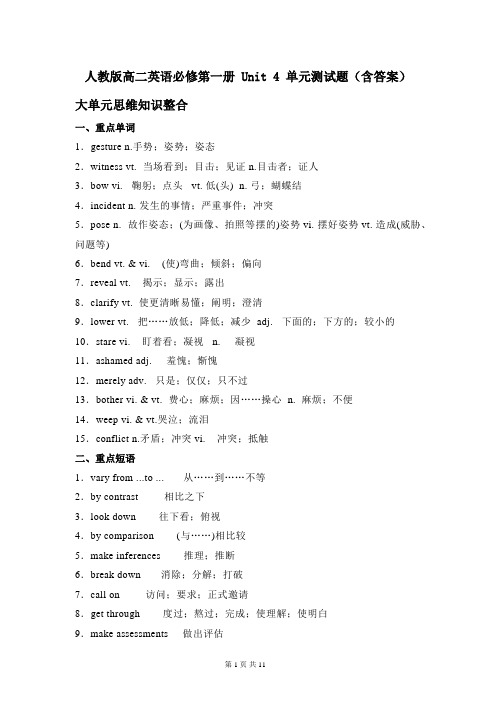
人教版高二英语必修第一册 Unit 4 单元测试题(含答案)大单元思维知识整合一、重点单词1.gesture n.手势;姿势;姿态2.witness vt. 当场看到;目击;见证n.目击者;证人3.bow vi. 鞠躬;点头 vt. 低(头) n. 弓;蝴蝶结4.incident n. 发生的事情;严重事件;冲突5.pose n. 故作姿态;(为画像、拍照等摆的)姿势vi. 摆好姿势vt. 造成(威胁、问题等)6.bend vt. & vi. (使)弯曲;倾斜;偏向7.reveal vt. 揭示;显示;露出8.clarify vt. 使更清晰易懂;阐明;澄清9.lower vt. 把……放低;降低;减少 adj. 下面的;下方的;较小的10.stare vi. 盯着看;凝视 n. 凝视11.ashamed adj. 羞愧;惭愧12.merely adv. 只是;仅仅;只不过13.bother vi. & vt. 费心;麻烦;因……操心 n. 麻烦;不便14.weep vi. & vt.哭泣;流泪15.conflict n.矛盾;冲突vi. 冲突;抵触二、重点短语1.vary from ...to ...从……到……不等2.by contrast 相比之下3.look down 往下看;俯视4.by comparison (与……)相比较5.make inferences 推理;推断6.break down 消除;分解;打破7.call on 访问;要求;正式邀请8.get through 度过;熬过;完成;使理解;使明白9.make assessments 做出评估10.be compared to 把……比作11.in other words 换句话说;也就是说12.at the same time 同时13.at work 有某种影响;在工作14.be based on 以……为基础/根据15.come up with 提出三、重点句型1.when doing…当when,while,before,after,unless,as if, if等引导的状语从句中的主语与主句主语一致或从句主语是it,且从句谓语中含有be动词时,可以省略从句中的主语和be动词2.nothing better than比较级的否定学生表示最高级四、重点用法1.In countries like France and Russia, people may kiss their friends on the cheek when they meet.在法国和俄罗斯等国家,朋友见面时可能会亲吻脸颊。
人教版高一英语第一册Unit 4 测试题(含答案)
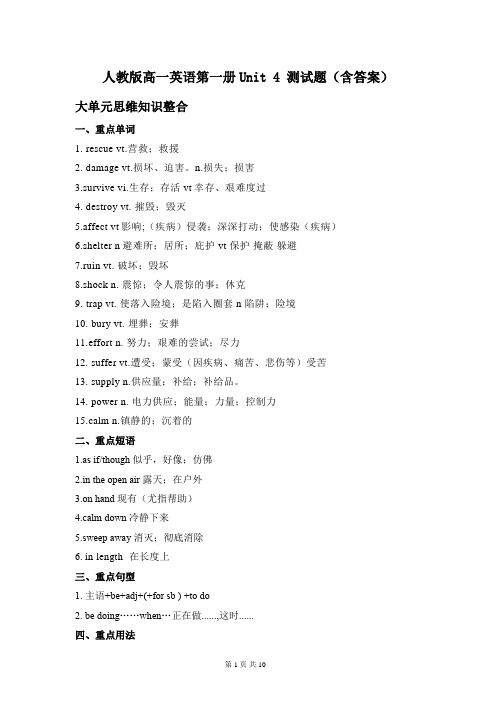
人教版高一英语第一册Unit 4 测试题(含答案)大单元思维知识整合一、重点单词1. rescue vt.营救;救援2. damage vt.损坏、迫害。
n.损失;损害3.survive vi.生存;存活 vt幸存、艰难度过4. destroy vt. 摧毁;毁灭5.affect vt影响;(疾病)侵袭;深深打动;使感染(疾病)6.shelter n避难所;居所;庇护 vt 保护掩蔽躲避7.ruin vt. 破坏;毁坏8.shock n. 震惊;令人震惊的事;休克9. trap vt. 使落入险境;是陷入圈套 n 陷阱;险境10. bury vt. 埋葬;安葬11.effort n. 努力;艰难的尝试;尽力12. suffer vt.遭受;蒙受(因疾病、痛苦、悲伤等)受苦13. supply n.供应量;补给;补给品。
14. power n. 电力供应;能量;力量;控制力15.calm n.镇静的;沉着的二、重点短语1.as if/though 似乎,好像;仿佛2.in the open air 露天;在户外3.on hand 现有(尤指帮助)4.calm down 冷静下来5.sweep away 消灭;彻底消除6. in length 在长度上三、重点句型1. 主语+be+adj+(+for sb ) +to do2. be doing……when…正在做......,这时......四、重点用法1. It seemed as if the world were coming to an end!as if 引导的从句一般用虚拟语气,但如果从句所表示的情况有明显的依据或实现的可能性较大,则用陈述语气。
例句:She looks as if she were 3 years younger.as if 引导的从句有时可用省略形式, as if 后面可接副词、不定式、名词、分词或介词短语等。
例句:He acted as if (he were) a fool.2. About 75 percent of the city’s factories and buildings, 90 percent of its homes, and all of its hospitals were gone.分数表达法:分子在前,分母在后;分子用基数词,分母用序数词。
- 1、下载文档前请自行甄别文档内容的完整性,平台不提供额外的编辑、内容补充、找答案等附加服务。
- 2、"仅部分预览"的文档,不可在线预览部分如存在完整性等问题,可反馈申请退款(可完整预览的文档不适用该条件!)。
- 3、如文档侵犯您的权益,请联系客服反馈,我们会尽快为您处理(人工客服工作时间:9:00-18:30)。
英语必修一第四单元测试及答案Unit 4 EarthquakesⅠ. 听录音,根据所听内容选择正确答案听第1~5段对话,分别完成第1~5题1. What are the two speakers talking about?A. Falling pictures.B. Shaking wall.C. A natural disaster.2. What should the woman do?A. She ought to speak to the other woman in person.B. She ought to give up her suggestion.C. She ought to shut up.3. What will the weather be like next week?A. Colder and snowy.B. Warmer but windy.C. Rainy and colder.4. What can we learn from this conversation?A. Smoking is not permitted in the room.B. The two speakers feel uncomfortable in the room.C. Stop the man from being angry.5. Why did Mary say that she couldn’t join in the party?A. She had something more important to do.B. She had to meet a friend of hers.C. She didn’t want to attend the party.听第6段对话,完成第6~8题6. What happened to the woman?A. She was trapped in an earthquake.B. She was lost in the forest.C. She ate some poisonous food in the forest.7. What can we learn from the conversation?A. She found a river without much difficulty.B. The monkey helped her gain confidence and hope.C. She walked out of the forest with the help of the monkey.8. How did the woman feel before she met the monkey?A. Tired but hopeful.B. Lonely and frightened.C. Excited and a little nervous.Ⅱ. 听录音,根据短文内容完成下列句子1. It was reported that about 242,000 people were _________ and over 164,000 were __________ in the earthquake.2. Many people in Tangshan reported seeing so-called “_______ _______” before the earthquake.3. Well water in a village outside the city of Tangshan _________ and _________ three times the day before the earthquake.4. It has been reported that animals in the area _________ the earthquake before it struck. And most animals in the city did in fact _________.Ⅲ. 单项选择,从A、B、C、D四个选项中,选择最佳答案完成句子1. The boy ________ on the ground ________ to me that his hen _______ three eggs a day.A. lies; lied; laidB. lying; lied; laidC. lay; lied; lainD. lay; lying; has laid2. A ________ in taxes will be necessary if we are to improve our education system.A. riseB. raiseC. reduceD. increase3. Sorry to hear that your father is ill. I ________ hope he will be well again soon.A. sincerelyB. immediatelyC. frequentlyD. fluently4. Alice received an invitation from her boss, ________ came asa surprise.A. itB. thisC. whichD. that5. Some people think that the weather of New York is _________, but the place is _______ tolive in.A. unpleased; excitingB. unpleased; excitedC. unpleasant; excitingD. unpleasant; excited6. After the Tsunami passed away, all the villages and towns were ________. And no being was seen.A. in ruinB. in ruinsC. at ruinsD. for ruins7.The bus driver was badly ________ on both legs in the traffic accident.A. woundedB. brokenC. injuredD. destroyed8. Can you tell me the name of the park ________ you visited last week?A. whatB. whereC. /D. when9. I have n’t seen both of her films, but ________ from the one I have seen I think she’s apromising actress.A. judgingB. judgeC. judgedD. judgment10. —Tom hasn’t come to class yet?—What do you think ________?A. did happen to himB. has happened to himC. he happenedD. he has happened11. I think your parents will be ________ excited to see you after many years’ study abroad.A. only tooB. rather tooC. very tooD. too much12. Mary seems ________ the bad news, for she looks nice and happy.A. not to have learnedB. not to be hearingC. not having learnedD. not to be heard13. —Would you like to go to play tennis with me in the school court this weekend?— ________ What about another time?A. I’d like that. Thanks.B. I’m sorry, I can’t.C. Great!D. No, not in the least.14. —We need a quick reply.—I see. I’ll send the paper to you _______.A. now and thenB. sooner or laterC. just nowD. right away15. Some journalists are especially fond of _______ the personal privacy of celebrities.A. looking forB. digging outC. digging atD. looking upⅣ. 将下列两个单句合并为一个定语从句1. ①Do you see the dictionary? ②I lent the dictionary to you yesterday.Do you see the dictionary _____________________________________________________?2. ①Where is the woman? ②I talked to the woman this morning.Where is the woman _________________________________________________________?3. ①Here are some exercises. ②They need to be done after class.Here are some exercises _______________________________________________________.4. ①The whole city was in ruins. ②75% of its factories and buildings were gone.The whole city was in ruins, ___________________________________________________.5. ①The army organized teams to dig out those miners and to bury the dead.②Miners were trapped.The army organized teams to dig out those miners ______________________________ and to bury the dead.Ⅴ. 根据汉语提示及重点词语将下列句子译成英语1. 当时我没怎么考虑自己孩子的安危。
